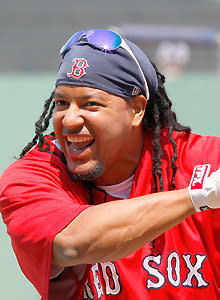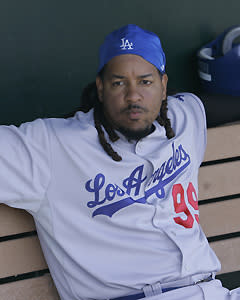Ramirez was a huge talent, colossal waste
The end of Manny Ramirez's(notes) career could not have been more perfect. In the middle of a Yankees-Red Sox game, with the jury for Barry Bonds' steroid-cum-perjury trial deliberating its verdict, Major League Baseball distributed an email that said Manny had retired after running afoul of its performance-enhancing drug program. In a system where only a fool fails a test, Manny had flunked for the second time.
The ultimate flake flaked out in the ultimate fashion.
And so we bid adieu to Manuel Aristides Ramirez Onelcida, superlative talent and undeniable waste, who caps what should've been a marvelous career with another taint.
Manny's legacy could have been as the most pure and accomplished right-handed hitter since Joe DiMaggio. Manny's legacy is trying to get pregnant as a 38-year-old male.
Oh, there had been incidents before his PED bust two years ago. Early on in his career, Manny being Manny was cute. He got pulled over once in Cleveland because the tint on his windows was too dark. He didn't have his driver's license and tried to talk his way out of a citation. It didn't work. So Manny did what anybody else would do: immediately made an illegal U-turn and got another ticket.
The signs of Ramirez unraveling started to show late in his tenure in Boston, when he shoved the Red Sox's Social Security-aged traveling secretary, couldn't keep straight which knee of his was injured and took evermore leisurely strolls to first base. When he fully nuked himself with the Red Sox in 2007, the sheen had come off Manny. The fun-loving nincompoop morphed into a calculating saboteur.
Still, he could hit. Lord, could Manny Ramirez hit. The count didn't matter. Pitch, either. High, low, inside, outside, fast, slow, straight, bent – Manny could crush it. He finished every swing with his left-arm extended high in the air, a pose that allowed him to appreciate the beauty of how he could launch a pitch. Steroids do not gift mortals a swing like Manny's; God does.
Anybody with an eye for aesthetics could appreciate Manny's ability to punish a ball. A locked-in Ramirez spread out hits on the grass better than a sprinkler. His hitting jags – particularly the one that carried Boston to its second World Series title with Manny hitting cleanup – cemented his legend in Boston. Larry Bird once told the Boston Globe that when Ramirez was at the plate, "I'm glued to the television. I'm stopping whatever I'm doing and I'm watching him hit the baseball." He was a savant, from his days as a teenager left alone by the gangs in Washington Heights because of his talent to his last swings as an ostensibly clean ballplayer two years ago.
The hilarity of Ramirez's first suspension – he was caught with a prescription for a women's fertility drug often used to mask PEDs – seemed to protect him from answering for it. Manny never talked about it. Others laughed it off. When the New York Times reported that Ramirez tested positive in 2003 as well, it begged the question of just how long Ramirez had been imbibing. But, hey. He was Manny. Bulletproof as long as he hit.
Then he stopped hitting. The Los Angeles Dodgers, who lavished $45 million on him the year after they acquired him from Boston, watched him regress and hit the disabled list. The Chicago White Sox dealt for him and saw a swing in desperate need of performance enhancement. They let him depart this offseason without pause.
When the Tampa Bay Rays signed Manny to a one-year, $2 million deal in late January, they hoped he had bottled up some of his magic and could locate it once more. Turned out he had. Manny used some sort of drug this offseason. He was tested upon arrival to Rays camp. The test came back positive. Rather than face a 100-game suspension, he slinked away.
He left with a weak pop-up to right field off Kevin Jepsen(notes) as a pinch hitter. With an .059 batting average, an .059 on-base percentage and an .059 slugging percentage. With the Rays reeling from an 0-6 start. With the feeling that he was like every other aging athlete who can't come to grips with his own body, his own mortality, the loss of something that forever came naturally to him, so he does everything he can to stop it until hubris does it for him. Athletes age faster than the rest of us; they also fight it harder – and dumber.
Even with baseball strengthening its drug policy, the incentive to take PEDs remains strong enough that the risk – in Manny's case, ending his career – felt worth it. That is sad. It is also indicative of his priorities. Baseball excellence mattered to him enough that he'd further soil his reputation in pursuit of it.
It is easy to damn him for his bad decisions. He made them with the frequency of someone one-tenth his age. It is easy, too, to savor his 555 home runs, no matter how many contaminated by drugs, because, like Bonds, his talent was pure, if not his results.
And now Manny's gone – from the game today and almost certainly from Hall of Fame consideration. As much as the inclination might be to wish good riddance to Ramirez, baseball will miss him.
There are only so many preternatural talents like Ramirez; and even fewer personalities to match his. The dreadlocks and imitators in Mannywood, the outfield bungles, the bathroom breaks inside the Green Monster – all are part of the Manny Ramirez tableau, a bright, bold, complicated one with the brightest of flames and dullest of fizzles.


